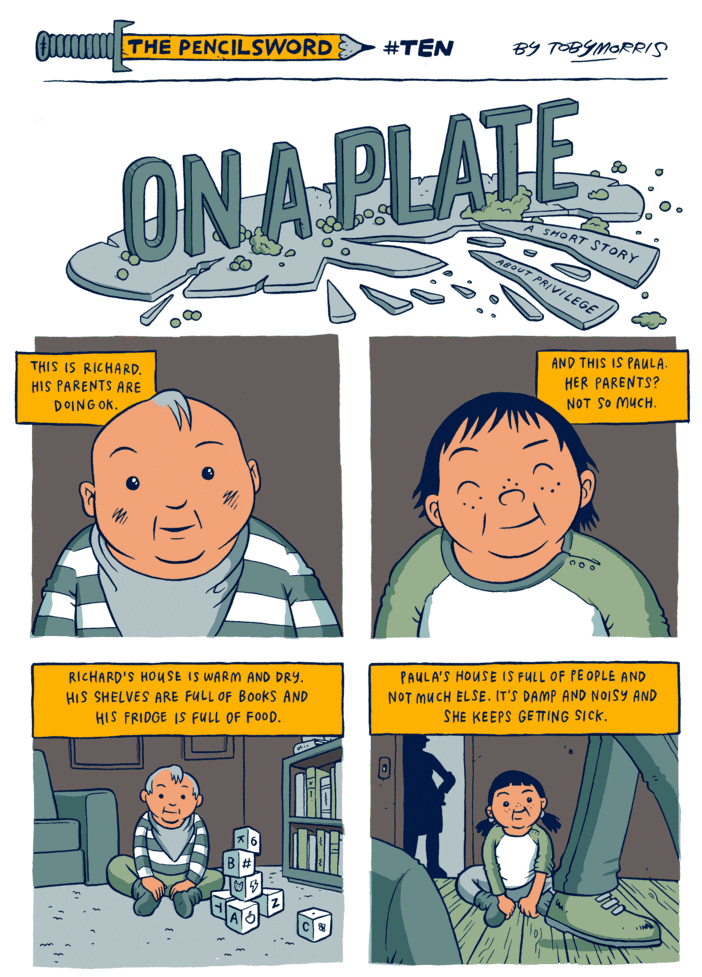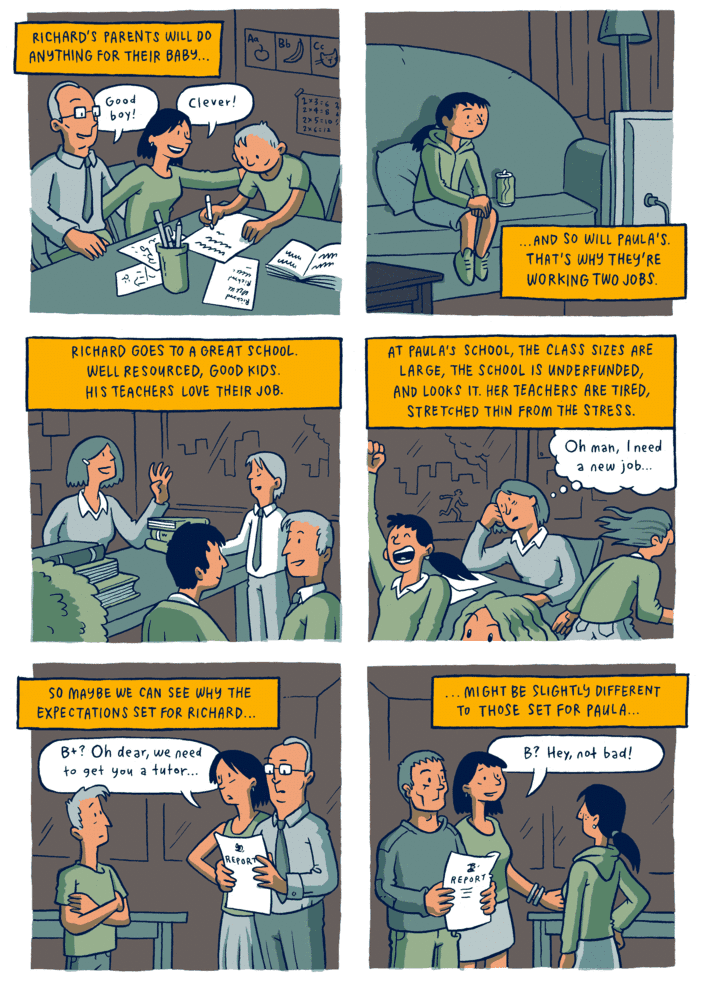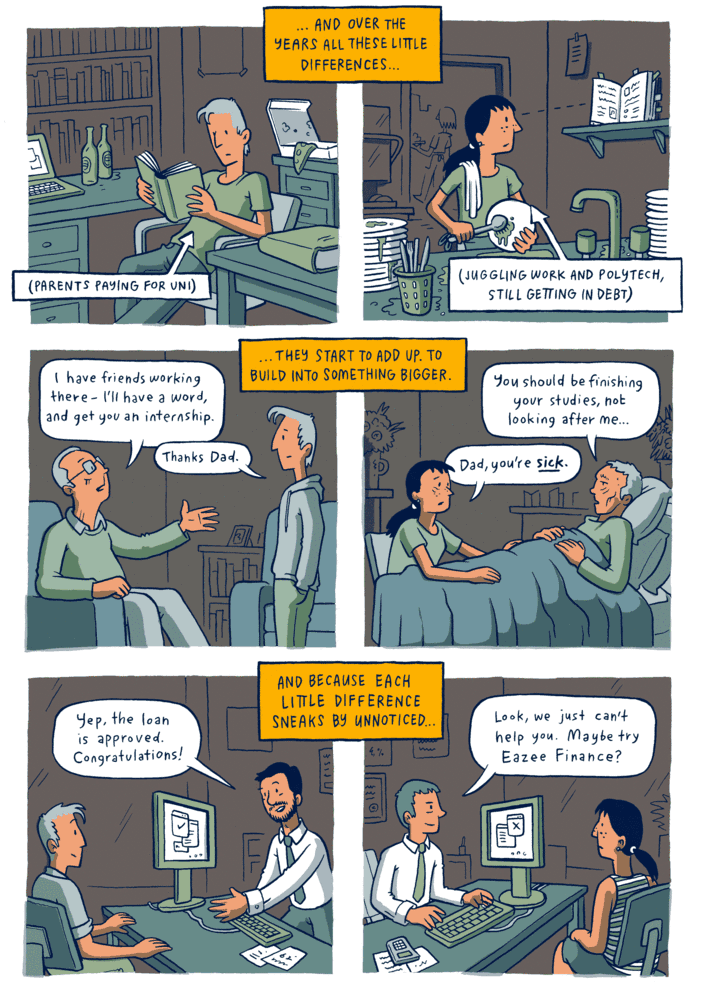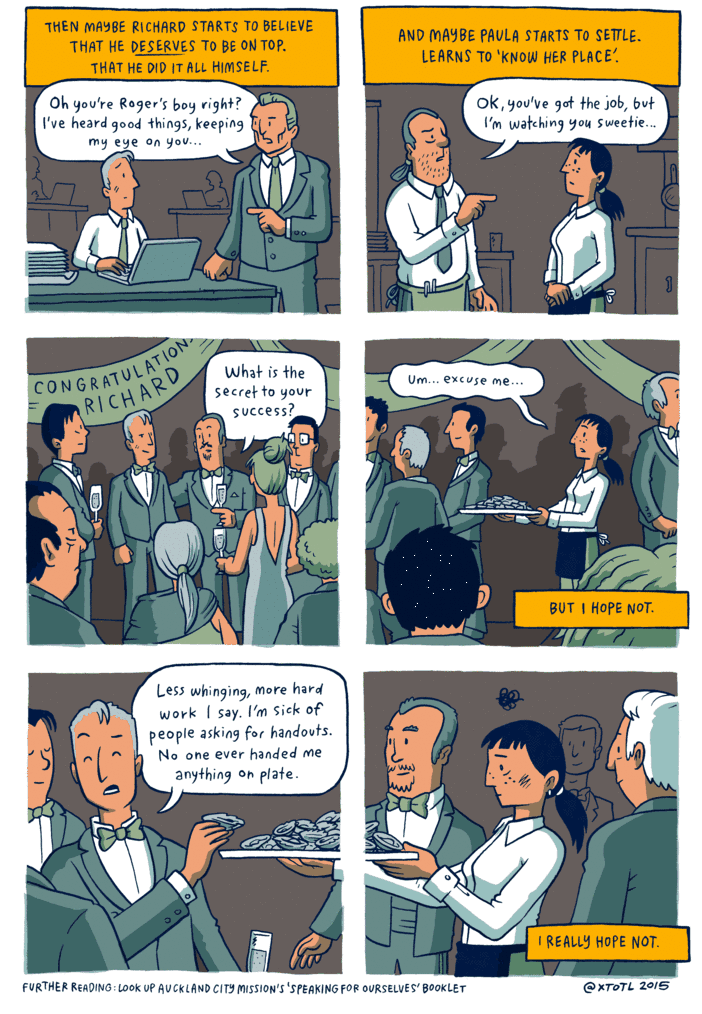Dear all,
since this debate on privilege seems to be running on and on, I do wonder whether we can move on at least a tiny bit from the, to my mind, totally uninteresting question of whether or not luck / bias / unfair advantages and privileges play important roles in careers (of course they do!) to the much more interesting and harder question about what, if anything, we can do about it that is actually meaningful.
As a very privileged old white guy I am totally and utterly aware that the genetic and socioeconomic lotteries have dealt me a lot of pretty good cards. I am also aware that small advantages can really compound over the duration of a long career. People who try to ask, "how much is luck, and how much is hard work" forget that even just having the physical and mental health and vigor and motivation to be able to work hard is a stroke of very good luck, which one too easily takes for granted. So if someone said, "hey, Jan, the fact that you have been able to have an enviably good career so far is 100% down to luck", then I would find it hard to prove them wrong. And all good luck is at some fundamental level undeserved. All of this seems so obvious to me that I am surprised people are still discussing the extent to which this is true or not.
The problem that I find much more interesting is where the opportunities really lie when it comes to mitigating some of the unfairness that inevitably comes out of genetic and societal lotteries. Here is a thought experiment: you are hiring a postdoc, you have two candidates, let's call them Richard and Paula in reference to the cartoon shared by Mario. Richard is very well prepared for the demands of the job, because he has had great training in all the relevant background, a strong support network and plenty of self belief. You are confident that he will get the studies completed in good time and push out the papers that will advance both his career and yours. Paula seems nice and intelligent, but she went to shitty schools, grew up in an intellectually impoverished environment, is underconfident and, unlike Richard, isn't up to speed about the latest in data science and optogenetics and physical acoustics. You think she would probably do well if you could give her enough guidance and patience and time to catch up, but compared to Richard she is clearly less likely to hit the ground running. The clock on the grant is ticking. You need a postdoc who brings home the bacon soon for that renewal application that is due next year. Let's be honest: how many of us would hire Paula?
These are the real forks in the road, and of course this is profoundly unfair against Paula who didn't choose to grow up in an underprivileged environment, but I don't see this unfairness as a solvable problem. And, more importantly for this discussion, I am at present completely unconvinced that introducing double blind peer review or preprint based new publishing models or whatever scientific publishing fad we embrace next is going to make any worthwhile dent in these fundamental inequalities.
ENeuro, for example, has for a while now operated double blind peer review to "mitigate the potential for implicit bias", as they state on their web site. To be honest with you guys: for me this is a major reason not to submit to ENeuro, because I do find anonymising my manuscripts with all bells and whistles is a big effort, and the number of people who do very similar stuff to what I do is so small that many peer reviewers can probably guess the lab this paper come from anyway, or at least narrow it down to a very small number. So for me, ENeuro double blind peer review is an example of how to waste a significant amount of energy on what I consider an ineffective pursuit of a noble cause. I just don't see how their review model can get enough Paulas their jobs to make it worth the non-trivial additional effort. At the end of the day, yes, we do need to be fair, but we also need to get a lot of science done.
Whenever you have diversity, be it genetic or societal or in personalities, you will inevitably have individuals who are in a better or a worse position to take advantage of particular opportunities, and even just small differences in opportunity early on can compound into huge differences in outcome over the course of a career. This is unfair to those who are less lucky, but I don't see a way of making this fundamental unfairness go away. Of course I consider it an important part of my personal ethics to try hard not to compound the unfairness by being racist or sexist or otherwise unfairly biased in my interactions with others. I also take pleasure in the fact that the field is becoming more diverse, with a lot more women, more colored faces, and a culture that is more tolerant than what we had 100, 50, or even 20 years ago, and I want this trend to continue. But I am also worried that we may get caught up in a lot of lengthy debate or arm twisted into espousing convoluted anti-bias methodologies that, although well intended, can't really make a dent in the status quo, and ultimately only drain people's energy and goodwill. What I want to know is: how do we get beyond belaboring obvious inequalities, or tedious virtue signalling? How do we identify concrete steps that actually make a real, worthwhile difference?
Best wishes,
Jan
---------------------------------------Prof Jan Schnupp
City University of Hong Kong
Dept. of Neuroscience
On Mon, 12 Jun 2023 at 12:13, Ruth Y. Litovsky <000000dae5b21e0e-dmarc-request@xxxxxxxxxxxxxxx> wrote:
Dear all,
I am glad to see a robust discussion about the role of privilege, bias discrimination, and harmful practices. I thank my colleagues who have chimed in so eloquently to raise awareness about these topics, whether bias is conscious or unconscious. This discussion is a long time coming and much needed. I reiterate the points made by others, urging us all to continue thinking about how it is our collective responsibility to act in ways that promote the careers of others, in particular colleagues from underrepresented minorities, women, and colleagues who have experienced barriers in their career paths.
I would like to draw our attention to the concept of White Fragility, from Robin DiAngelo’s book. This book discusses the observations that White people can be angry, defensive, or hostile when they are told that have played a role in systemic racism. White Fragility identifies how white society has failed to understand the structural nature of racism. More important, this book (and many other eloquent writings on this and related topics) powerfully argues for why White people must accept their individual and collective responsibility for racism, discrimination, and oppression.
Many of us believe that this applies to our role as scientists and educators.
The goal of this kind of a discussion is not to shame anyone into being embarrassed for their success. The goal is to raise awareness of our own biases, and to change the way that our field manages areas that are important for people’s careers. Science is fun but it’s also tough! Success is measured through high bars, and our own creation of a peer review system that has many flaws. Much of the progress that we can make is through better mentoring systems, open conversation about the things that make us uncomfortable, actively diversifying scientists and scientific ideas, better processes for peer review and huge improvement in the policies and procedures that determine career advancement. Importantly, so many of us see huge value in continuing to build an inclusive and welcoming community.
Yours,
Ruth Litovsky
From: AUDITORY - Research in Auditory Perception <AUDITORY@xxxxxxxxxxxxxxx> on behalf of Ken Grant <ken.w.grant@xxxxxxxxx>
Date: Friday, June 9, 2023 at 11:15 PM
To: AUDITORY@xxxxxxxxxxxxxxx <AUDITORY@xxxxxxxxxxxxxxx>
Subject: Re: [External] Re: arXiv web of trustThank you Alexandria for expressing what it means to have systemic obstacles and barriers to success throughout our society. Folks got upset when the Black Lives Matter movement took off because they were wondering "don't White Lives Matter as well". Anyone who felt this way misunderstood the entire enterprise. Nobody ever claimed that white lives don't matter, or matter more, or matter less. A good friend suggested that, if the Black Lives Matter movement had printed signs that read "Black Lives Matter Too". While I understood his point and that I can see how this might have helped white male americans feel better, this too misses the point. Centuries of inequities do not get wiped away in an instant. Declaring racism over is a monstrous error. Some scientists rise to the top of their fields by working very very hard. But as the cartoon displayed, not all children, adolescents, or teens have the same opportunities. The cards are stacked in favor of those with privilege, and your comment that recognizing this fact might make us more willing and able to consider these systemic obstacles.
On Fri, Jun 9, 2023 at 12:15 AM Bernstein,Leslie <lbernstein@xxxxxxxx> wrote:
I disagree. I think I understand the points and the reality quite well.
Les
From: "Lesicko, Alexandria" <Alexandria.Lesicko@xxxxxxxxxxxxxxxxxxxxxx>
Date: Thu, Jun 8, 2023, 5:06 PM
To: "Bernstein,Leslie" <lbernstein@xxxxxxxx>, AUDITORY@xxxxxxxxxxxxxxx
Subject: Re: [External] Re: arXiv web of trust*** Attention: This is an external email. Use caution responding, opening attachments or clicking on links. ***
I think it's important to establish the DC-level, sea-level, the "reference level." The societal inequities that exist are not because I and other "white guys" (i.e., the "Richards" in the cartoon) were given some undeserved privilege but, rather, because some minorities and cultures (i.e., the Paula's in the cartoon) have been unfairly denied their due. I think it very much matters where one perceives the unfairness to be.
I think you are missing the main point of the cartoons that have been shared here. They are meant to illustrate the point that our gender, racial, etc. identities and economic realities shape our experiences and opportunities in science and in the world. This benefits some people and works against others. The “perceived unfairness” isn’t on one side of the coin or the other, it is all a product of the same system.
I find the self-loathing concept of "privilege" to be misguided folly I will not apologize for what I have accomplished and for what I have. It was not handed to me. For those who still don't understand, I'll say it again. The social injustice lies in the fact that the less fortunate (often minority cultures and ethnicities) have been denied the opportunity and dignity they deserve as human beings. That is where we must focus our efforts for change.
I think this is also a misunderstanding - I don’t think that the concept of privilege invokes self-loathing. Nobody is asking you to apologize and hate yourself for whatever privileges you may have. Further, nobody is saying that you have not worked hard for your accomplishments. My understanding of acknowledging privilege is that it is about humility rather than self-loathing. For example, understanding that my path in life and in my career may have looked different and involved more obstacles if I were a person of color, queer, disabled, etc. You can still be proud of your accomplishments and your hard work while acknowledging this. I also don’t think acknowledging privilege is the end goal in these discussions or an exercise unto itself, but a necessary step in the process of beginning to tackle the social injustices that you mention above. If we cannot first admit that these factors play a role in our trajectories, then it is hard to get any further in enacting change - we are blind to what we are trying to tackle.
It is trivially true to say that, in any field, in any vocation, in any hierarchy, there are biases that come into play. That's because they are all human endeavors. Matters of degree count! In our field of auditory science-- and this is after all the Auditory List-- others here have asserted that discriminatory factors must be at play to a substantial degree. I think that is patently false and my observations across decades support that belief.
You cannot say that because you have not experienced or witnessed discrimination in this field that it does not exist. All you can say is that you have not experienced or witnessed it. Other people on this thread are telling you that their experiences have been different (and citing literature that points to the existence of bias and discrimination at large). Again, it is important to listen to and acknowledge the experiences of other people if we want to address social injustice. People from different demographic backgrounds can have radically different experiences of the same community. You can simultaneously take pride in your field and your community and want to make it better.
Some of you have acted as "scientists" drawing conclusions on the basis of essentially no evidence when you have implied that I, personally, must have a myopic view because you assume that I'm just another fairly successful old white guy. Shame on you. You know nothing of my history and that of my family. You commit the genetic fallacy, that of evaluating an idea on the basis of who generated the idea, rather than on the merits of the idea, per se. In so doing, you commit the very sin that you decry so vociferously in self-righteous fashion!
It seems that most people are replying directly to what you said, point-by-point, not assuming that you must be myopic because you are, as you describe, a “fairly successful old white guy”. 😊
I suggest that you read this excellent work by the brilliant linguist, John McWhorter.
This began as a discussion of open-access dissemination of scientific results. I hope, if this thread continues at all, it will return to that topic, a topic that is most appropriate for the Auditory List.
I don’t think that these topics are inappropriate and are actually very important and beneficial to discuss.
Les
From: AUDITORY - Research in Auditory Perception <AUDITORY@xxxxxxxxxxxxxxx> on behalf of Les Bernstein <lbernstein@xxxxxxxx>
Date: Thursday, June 8, 2023 at 12:10 AM
To: AUDITORY@xxxxxxxxxxxxxxx <AUDITORY@xxxxxxxxxxxxxxx>
Subject: [External] Re: arXiv web of trustI think it's important to establish the DC-level, sea-level, the "reference level." The societal inequities that exist are not because I and other "white guys" (i.e., the "Richards" in the cartoon) were given some undeserved privilege but, rather, because some minorities and cultures (i.e., the Paula's in the cartoon) have been unfairly denied their due. I think it very much matters where one perceives the unfairness to be.
I find the self-loathing concept of "privilege" to be misguided folly I will not apologize for what I have accomplished and for what I have. It was not handed to me. For those who still don't understand, I'll say it again. The social injustice lies in the fact that the less fortunate (often minority cultures and ethnicities) have been denied the opportunity and dignity they deserve as human beings. That is where we must focus our efforts for change.
It is trivially true to say that, in any field, in any vocation, in any hierarchy, there are biases that come into play. That's because they are all human endeavors. Matters of degree count! In our field of auditory science-- and this is after all the Auditory List-- others here have asserted that discriminatory factors must be at play to a substantial degree. I think that is patently false and my observations across decades support that belief.
Some of you have acted as "scientists" drawing conclusions on the basis of essentially no evidence when you have implied that I, personally, must have a myopic view because you assume that I'm just another fairly successful old white guy. Shame on you. You know nothing of my history and that of my family. You commit the genetic fallacy, that of evaluating an idea on the basis of who generated the idea, rather than on the merits of the idea, per se. In so doing, you commit the very sin that you decry so vociferously in self-righteous fashion!
I suggest that you read this excellent work by the brilliant linguist, John McWhorter.
This began as a discussion of open-access dissemination of scientific results. I hope, if this thread continues at all, it will return to that topic, a topic that is most appropriate for the Auditory List.
Les
On 6/4/2023 9:24 PM, Svirsky, Mario wrote:*** Attention: This is an external email. Use caution responding, opening attachments or clicking on links. ***
I have a small contribution to the very interesting conversation between Matt Winn and Les Bernstein.
I recommend those of you who are also interested in this conversation watch “Picture a Scientist”, which is on Netflix in the U.S. until June 12. It is a fascinating description of some of the obstacles faced by women in general and black women in particular, in academia.
I agree with Les that, ideally, status as a researcher should be earned by a person’s contributions to their field. The problem is that in the real world women get fewer resources and less recognition than men given the same intellect and productivity. Ditto for minorities. “Picture a Scientist” doesn’t even get into the issues of class, nationality, or able bodiedness, which are also important.
Or instead of watching Picture a Scientist (which, after all, will take you 103 minutes), you could invest just two minutes in reading the cartoon below. About the concept of having things handed to you on a plate (or “being born on third base and thinking you hit a triple”, a quote attributed to Barry Switzer, 1986).
Mario A. Svirsky, Ph.D.
Noel L. Cohen Professor of Hearing Science,
Professor of Otolaryngology (School of Medicine) and Neural Science
Vice-Chairman for Research
Department of Otolaryngology
Address:
Dept. of Otolaryngology Phone (direct): 212-263-7217
NYU Langone Medical Center Fax: 212-263-7604 or 212-263-8257
550 First Ave., NBV-5E5
New York, NY 10016
Pronouns: he, him, his
CONFIDENTIAL - NYU SCHOOL OF MEDICINE SENSITIVE DOCUMENT
“This email message, including any attachments, is for the sole use of the intended recipient(s) and may contain information that is proprietary, confidential, and exempt from disclosure under applicable law. Any unauthorized review, use, disclosure, or distribution is prohibited. If you have received this email in error please notify the sender by return email and delete the original message. Please note, the recipient should check this email and any attachments for the presence of viruses. The organization accepts no liability for any damage caused by any virus transmitted by this email.”
--
Leslie R. Bernstein, Ph.D. | Professor Emeritus
Depts. of Neuroscience and Surgery (Otolaryngology) | UConn School of Medicine
263 Farmington Avenue, Farmington, CT 06030-3401
Office: 860.679.4622 | Fax: 860.679.2495




